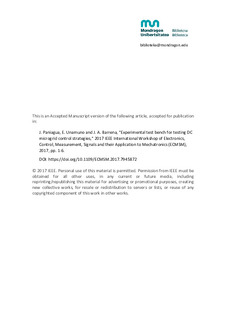Izenburua
Experimental test bench for testing DC microgrid control strategiesBertsioa
Postprinta
Eskubideak
© 2017 IEEESarbidea
Sarbide irekiaArgitaratzailearen bertsioa
https://doi.org/10.1109/ECMSM.2017.7945872Non argitaratua
IEEE International Workshop of Electronics, Control, Measurement, Signals and their Application to Mechatronics (ECMSM) San Sebastian. 24-26 May. IEEE,Argitaratzailea
IEEEGako-hitzak
microgrids
Switches
Digital signal processing
Topology ... [+]
Switches
Digital signal processing
Topology ... [+]
microgrids
Switches
Digital signal processing
Topology
testing
Energy storage
Mathematical model [-]
Switches
Digital signal processing
Topology
testing
Energy storage
Mathematical model [-]
Laburpena
During the last decades the number of microgrids and their research have increased notably, as they offer a high versatility for the integration of distributed generation (DG) units and renewable ener ... [+]
During the last decades the number of microgrids and their research have increased notably, as they offer a high versatility for the integration of distributed generation (DG) units and renewable energies. Among the different types of microgrids, dc systems are becoming more popular due to their advantages over conventional ac systems. However, their control techniques differ from the ones employed at ac networks, and depending on the device type-either generation, storage systems or loads-alternative control techniques need to be developed. Therefore, in this paper an experimental dc platform is developed with the aim of testing and evaluating these kind of control strategies. This test bench consists of a bidirectional four switch buck-boost converter together with a TMS320F28335 DSP for the implementation of the control strategy on each power converter. The proposed platform is suitable for integrating these systems at a 48 V dc bus and facilitates the evaluation of a wide range of control strategies as they are implemented in the Matlab/Simulink ® environment. In this case, the validation of the experimental platform has been carried out by implementing a virtual-impedance-based control technique. The experimental results included in the paper corroborate the suitability of the platform for the evaluation of control techniques for dc microgrids. [-]






















